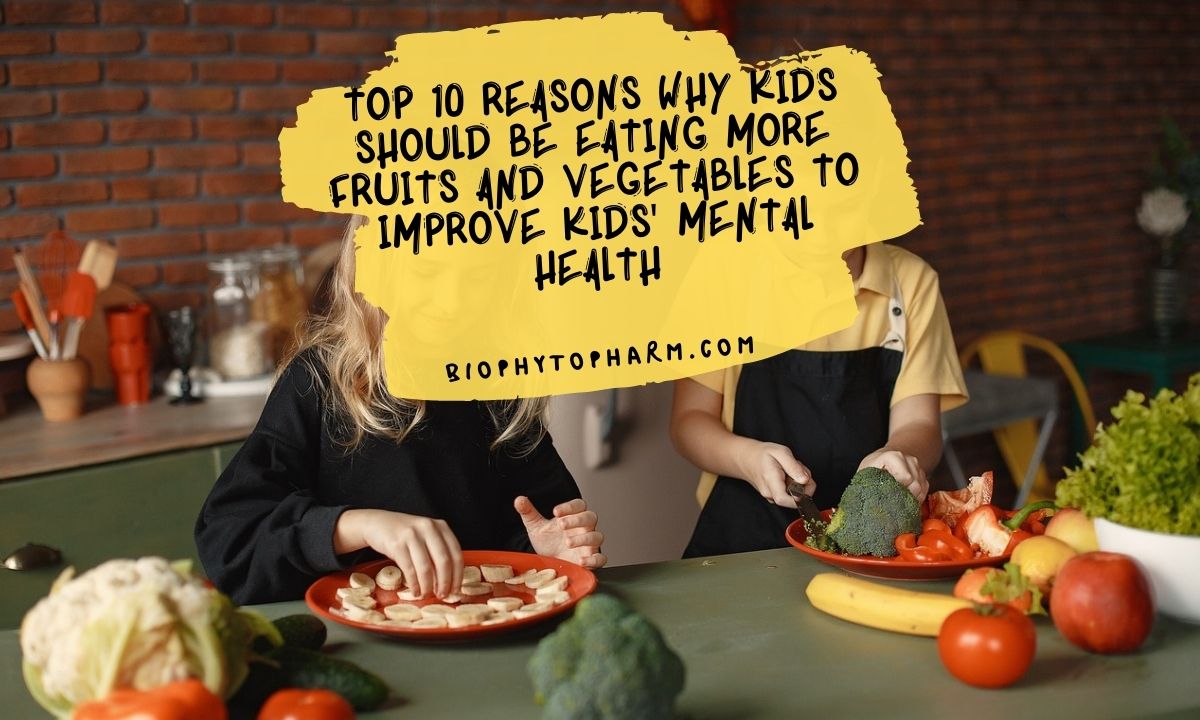“Fruits and vegetables are not only good for your health, but they’re also a fun way to get your kids to eat their fruits and vegetables. Here are the top 10 reasons why kids should be eating more fruits and vegetables.”
How Kids Mental Health Can be Predicted by the Blood Chemistry of Fruit & Vegetables
Mental health is often something that people think about when it’s too late. It is important to understand our mental wellbeing and what might be causing it.
A new study has found that certain fruits and vegetables have the potential to predict the mental health of kids. With the help of blood chemistry, they have created a test for analyzing fruits & vegetables for their levels of dopamine, serotonin, epinephrine, and norepinephrine.
The findings suggest that the fruit vegetables are more likely to have high levels of dopamine which are associated with feeling happy, energetic, relaxed, or focused. The vegetables are more likely to have high serotonin which is associated with calmness, happiness, and euphoria. Lastly, the fruit vegetables are more likely to have high epinephrine which makes them alert and active while.
Children’s Mental Wellness?
The question is what can be done to improve the mental health of children?
The most important thing a parent can do is to encourage a child’s full participation in play. This would help in developing their social skills and give them a sense of control over their lives. Parents should also ensure that kids have access to nutritious food, especially fruits and vegetables. Lastly, parents must model healthy behavior for their kids so that they can learn it from an early age.
Mental wellness is one of the most important steps in making sure children maintain good physical and mental health throughout life. There are many ways that parents can help improve child mental wellness, but it all starts with having a healthy diet for them from an early age.
What are the Best Fruits & Veggies to Feed Children?
The topic of fruit and vegetables might seem like an insignificant one, but it is actually a pretty important issue when it comes to mental wellbeing. What we put in our kids’ mouths affects their overall wellbeing and mood.
So what do you need to know when considering how best to feed your child?
- Different fruits and vegetables have different effects on the brain and mental health
- Fruits and vegetables are high in micronutrients that strengthen the immune system
- Picking the right types of fruits and veggies for your child’s age is crucial
- It’s important to consider how fruit and vegetable consumption can affect a child’s growth
Best Fruits & Veggies list for kids’ mental health?
It is not easy to ensure that your child eats the right amount of fruits and vegetables. With this list, parents can be assured that they are providing what their child needs for healthy mental and physical well-being.
Fruits and veggies are an important part of a healthy diet for kids. But it can be challenging to teach them which ones they should eat, how much, and when. This list helps parents figure out what their child needs in order to improve their mental health as well as watch out for any signs of toxicity or malnutrition.
This list includes a variety of fruits and vegetables that have been proven to have positive effects on both physical and mental health.
While there are many fruits and veggies that are good for the mental health of children, the best ones for this purpose include:
- Apple – Packed with antioxidants to help fight inflammation and dangerous free radicals in the body.
- Avocado – Rich in monounsaturated fats that can reduce the risk of heart disease.
- Watermelon – This fruit contains lycopene which has been shown to protect against cancer cells. It also contains significant amounts of vitamin C which help fight infection and boost overall immunity levels.
- Berries – They contain antioxidants like anthocyanins which can be anti-inflammatory.
- Dark leafy greens – are considered to be one of the most nutritious leafy vegetables. These benefits are attributed to the presence of chlorophyll, which is a natural source of antioxidants. Dark leafy greens vegetables provide the body with important nutrients like iron, calcium, and B12.
- Carrots – Carrots are a key building block in the diet of many children in the United States. According to the National Health and Nutrition Examination Survey conducted by the Centers for Disease Control and Prevention, in 1999-2000 only 2% of children ate five or more servings of vegetables per day. By 2015-2016, 31% of children were eating five or more vegetables per day. The increase is likely due to an increased emphasis on fruits and vegetables in school meals over recent years.
- Spinach – Spinach is a very healthy food that contains high levels of vitamins, antioxidants, and minerals. It also has many benefits for the human body. Spinach is commonly known as a healthy food that can provide benefits for your child’s health. However, not all adults are aware of spinach’s positive effects on children.
Snack suggestions
Include vegetables and fruit in snacks too. Try these ideas for snacks:
Cut-up vegetables with salsa or yogurt dips
Muffins, pikelets, or cakes made with added fruit or vegetables
Frozen fruit or vegetable segments
Skewers of fruit
Stewed fruit
Fruit crumble
Tinned fruits in juice
Fruit salad or a fruit platter
Corn on the cob
Jacket potato
Pumpkin soup or minestrone
Plain homemade popcorn
Why are Fruits & Vegetables Important to Kids’ mental health?
One of the main benefits of fruits and vegetables is that they provide a lot of vitamins, minerals, antioxidants, and fiber. They help kids to maintain healthy body weight, while also keeping them full longer.
Additionally, these healthy foods can help to improve your child’s thinking skills by providing them with more energy and focus. The fiber in fruits and vegetables also plays an important role in helping children regulate their emotions during tough times such as when they’re stressed about schoolwork or other things in their lives.
It is well known that fruits and vegetables do a lot for the overall health of children, but they also have a significant impact on their mental health.
The following are some ways that consuming more fruits and vegetables can benefit kids’ mental health:
- Fruits and vegetables contain antioxidants that help to strengthen the immune system.
- Additionally, these food groups also provide nutrients such as zinc, selenium, folate, and vitamin B12.
- The fiber found in fruits and vegetables regulates bowel movements and prevents constipation.
Many people like having their fruit or vegetables as a side dish with a meal or as a dessert that they share with their family and friends. In this section, we will be talking about flavors and textures of fruits and vegetables that you can enjoy during your mealtime.
There are many fruits and vegetables that are low-calorie or low-fat, which is important for children since they can be picky eaters. You can also find foods that contain a lot of fiber, calcium, iron, vitamins A and C, zinc, magnesium, and potassium.
Fruit and Vegetable consumption should be encouraged for everyone, especially for kids. The benefits of fruits and vegetables are numerous, including protection against cancer.
The most common issue with childhood obesity is that it is hard to get kids to eat their fruits and vegetables. However, there are many ways people can help their kids get more fruit in their diets.
There are many benefits of adding fruits and vegetables to your child’s diet. One such benefit is that they provide a variety of vitamins and minerals. They also provide fiber, which can prevent weight gain in children.
You can keep your kid’s snacks in this handy-dandy container that will help you keep their favorite foods fresh for days. This way you won’t need to waste time selecting what they want each day or making endless batches of fruits and veggies that will spoil soon.
Finally, fruit and vegetable consumption has been linked to improved moods as well as reduced anxiety levels.
How can parents help their young children eat more fruits and vegetables?
Kids can help their parents eat healthily. This is possible because they are the ones who want to eat healthier food, not their parents.
Many kids are not eating enough fruits and vegetables because they’re too busy with their activities to stop and try something new. The good news is that there are now ways to encourage kids to eat more fruits and veggies without adding too many extra steps or restrictions.
One strategy includes letting children help make what they want for breakfast, lunch, or dinner – something like a fruit smoothie or fresh vegetable salad. These simple changes can make a big difference in the number of fruits and vegetables kids are eating.
Conclusion
For many kids, the psychological and physical benefits of fruits and vegetables never materialized. This is due to the fact that their parents didn’t develop a taste for them.
Fruits and vegetables provide a range of essential nutrients and so it’s important to not only eat them but also talk to your children about why they should be eaten.
To help better guide your child, here are some tips on how to get them started:
1) Find out what they like: Talk to your kids about what fruits and vegetables they like the most (they don’t have to like all types). You can also get them involved in picking out fruits and vegetables from the store.
2) Get creative: Use colorful fruits or vegetables as inspiration for drawing pictures or creating other art projects with their hobby.





